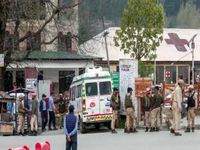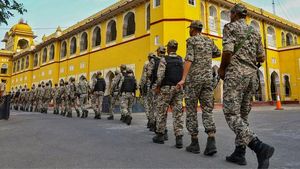In a significant military operation dubbed "Operation Sindoor," the Indian Armed Forces have conducted airstrikes targeting nine terrorist camps in Pakistan-occupied Kashmir (POK). This operation was initiated in response to a brutal terrorist attack in Pahalgam, Jammu and Kashmir, on April 22, 2025, which resulted in the deaths of 25 Indians and one Nepalese national. The airstrikes were carried out by the Indian Air Force and were reported to have successfully hit all designated targets.
According to the Indian government, the operation aimed at dismantling terrorist infrastructure that has been used to plan and execute attacks against India. The airstrikes targeted locations in Bahawalpur, Muridke, Sawai, Gulpur, Bilal, Kotli, Barnala, Sarjal, and Muhamuna, with distances from the international border ranging from 8 to 100 kilometers. Reports indicate that the operation was not just a military response but also a cultural and emotional retaliation against the attack on Indian tourists.
"Operation Sindoor" is seen as a significant move by the Indian government to assert its military capabilities and respond decisively to terrorism emanating from Pakistan. The name of the operation itself carries deep cultural significance, as it symbolizes the wiping away of the 'sindoor' or vermilion, which is often associated with the sanctity of marriage and family. This aspect has been highlighted as a means of providing some measure of justice to the families affected by the Pahalgam attack.
Following the airstrikes, Prime Minister Narendra Modi canceled his scheduled foreign trips to Croatia, Norway, and the Netherlands, emphasizing the seriousness with which the Indian government is treating the situation. The operation has drawn mixed reactions, with Pakistani Prime Minister Shahbaz Sharif asserting that Pakistan has the right to respond decisively to what he termed an act of war.
In a statement, Sharif said, "Pakistan will respond to this aggression in a manner that is appropriate. The morale of the Pakistani people and military remains strong, and we are prepared to defend our sovereignty." The international community, including the United Nations, has called for restraint from both nations, with UN Secretary-General Antonio Guterres expressing concern over the escalating tensions.
Foreign Secretary Vikram Misri addressed the media, stating that the Pahalgam attack was a part of a larger strategy to destabilize Jammu and Kashmir. He noted that last year saw over 2.25 million tourists visit Kashmir, and the attack aimed to disrupt the peace and progress of the region. Misri also confirmed that the operation targeted specific terrorist camps without intending to harm civilian lives.
Colonel Sophia Qureshi elaborated on the operation's execution, emphasizing that precautions were taken to avoid collateral damage. She stated, "This operation was conducted responsibly, focusing on the terrorists who are actively plotting against India. We aimed to deliver justice to the victims of the Pahalgam attack." Reports indicate that the strikes resulted in the deaths of several high-profile terrorists, including members of Masood Azhar's family, with estimates suggesting that up to 16 individuals were killed in the strikes.
As tensions rise, the Pakistani military has increased its presence along the border, with reports of heightened security measures in response to the airstrikes. Local witnesses described a scene of chaos following the strikes, with emergency services responding to the aftermath. One resident of Muzaffarabad recounted, "We were deep in sleep when the explosions woke us. We immediately ran outside to find our neighbors doing the same. The whole area was in panic." Eyewitness accounts indicate that while many residents had evacuated, there were still civilians in the vicinity during the strikes.
The airstrikes have also led to disruptions in air travel, with several airlines, including Air India and SpiceJet, canceling or rerouting flights to and from Jammu and Kashmir due to the heightened military activity. The Indian government has taken precautionary measures, closing schools and educational institutions in several districts to ensure the safety of students amid the ongoing tensions.
As the situation continues to develop, both nations remain on high alert, with the potential for further military engagements looming. The international community watches closely, urging both sides to exercise restraint and seek diplomatic solutions to avoid further escalation.
In summary, "Operation Sindoor" marks a pivotal moment in Indo-Pak relations, reflecting the ongoing struggle against terrorism and the complexities of regional security dynamics. The operation not only aims to retaliate against past attacks but also serves as a reminder of the fragile peace that exists between the two nations.






